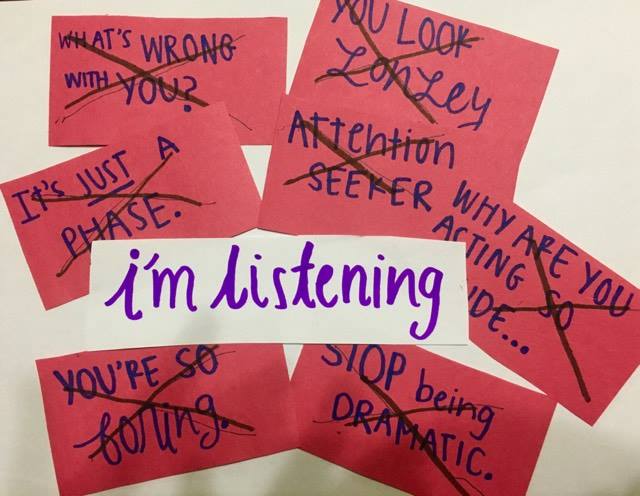Valuable role of friendship in mental health journey (Part 2 of 2)
For the first time in your friendship, you are at a loss for words. As your companion breaks down, you cannot bring yourself to reassure them with the convenient phrase “it’s OK,” because this time, it’s not.
Mental illness comes in various forms and levels of severity. Meaning to give general advice on dealing with, or effectively communicating with an individual who struggles with a mental illness would be fairly impossible, as every individual’s struggle is not the same.
“Mental illness can be a very isolating experience,” Dr. Laura Sanders, a psychologist at DFW Assessment PLLC, said.
But remember that you are not completely powerless in your loved one’s journey of dealing with mental illness. Your power is in the understanding and patience you provide to an individual in their time of distress.
They are still your friend. Regardless of how self-consuming a mental illness can be, you must never convince yourself that you have lost your friend. Although they may have momentarily lost themselves in their struggle, or have become unrecognizable bearing the weight of new pain, it is your role as a friend to be their anchor. To lift them with the warm familiarity of your friendship and remind them and yourself that although at present your relationship may feel different or distant, it is still strong.
Educate yourself. Often the most helpful attribute to possess while providing support to a loved one is to be knowledgeable of their diagnosis. If a diagnosis has not been disclosed, be educated on the very simple fact that you will not always comprehend what they are going through or the causes of their behavior – reasons they also may be unaware of. This uncertainty is extremely sensitive, therefore, “It is important to remain mindful of our interactions with others,” Sanders said.
Listen. When in doubt, offer support, stability and compassion in conversation and leave any advising to the professional psychological or medical experts. There is a time and place to listen and to give advice. Although human nature is to want to help, due to the delicate nature of a mental illness comments made can be unintentionally translated as intrusive and cause even more problems. To listen can sometimes be the most powerful tool. When someone feels that they are being heard, their pain may slightly alleviate, especially when they are comforted with the knowledge that what they are going through is acknowledged not ignored.
Mental illness is not always a horror show. “Mental illnesses are often invisible disabilities,” Sanders said. Illnesses and the different diagnoses they bring do not all look the same. The perceived image of a constantly depressed and antisocial individual is not to be associated with every person who struggles with a mental illness. When we choose to equate someone to our “go-to” image of mental illness, “We risk making generalizations, assuming cause and future behavior and may not engage to truly get to know the individual,” Sanders said.
Time is not always the answer. To suggest time as a cure for psychological distress, although well intentioned, is to undermine a mental illness as merely a phase – something that will easily pass. Research shows that many mental health disorders have a strong neurological basis. Of course with time gradual improvement can occur, but only if there is treatment. “Until there is effort to help through medication and/or therapy, it is unlikely the symptoms will just ‘pass’,” Sanders said.
Communication.“When someone tells you their experience, believe them,” Sanders said. “Just because you have not had a similar experience or thought does not make theirs invalid.” Conversing with your loved one plays an important part in providing comfort and relief but also understanding how they are feeling. To cherish and preserve their trust is important, however, “Keeping secrets when a friend or loved one expresses threats to themselves or others is never a good idea,” Sanders said.
Take care of yourself. As you adjust to the emotions and stresses of loving someone with a mental illness, it’s important to remember to take of yourself. Take time to do things you enjoy that simultaneously keep your stress levels in check. Your stability often affects the strength of the support you give your loved one. You will be more capable of supporting the individual if you consider and maintain your own mental and physical health. Supporting an individual with a mental illness is difficult. At times you may feel helpless or see little progress, but remember that your acceptance, patience and love are more impactful than you will ever realize. Treat your loved one and yourself with kindness and seek adequate support. A challenge like this is not easy for anyone.

Junior, Briana Thomas, is a South Asian writer whose stories are unfiltered outlets that voice her passions, opinions and beliefs. Briana is intrigued...













